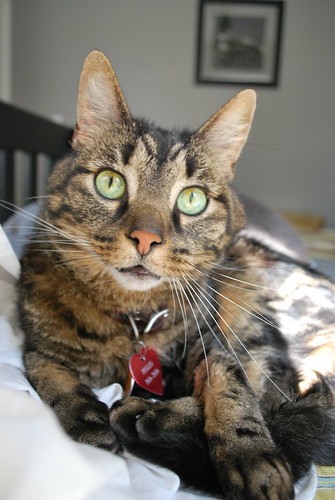After spending more than a week wholly wrapped up in Middlemarch, with its ambition to paint a vivid, emotionally and intellectually rich portrait of the life of an 1830s village, it was with real pleasure that I sat down last night with a book of much more modest aims, Jacques Poulin's Mister Blue (1989, translated from French by Sheila Fischman in 2011).
Whereas Eliot wanted us to take in the world, and, having done so, understand it, all Poulin is asking of us in Mister Blue is to pause a moment, attend to the world, and reflect. The novel is told in the quiet, contemplative voice of Jim, a writer who says of himself,
I'm not very good at introspection. Generally what I do is glide along the surface of things like a drifting raft that knows nothing about what goes on in the depths of the sea.And while that's an exaggeration, it's not terribly far off the mark: Jim lives alone with his cat, Mister Blue, on a cliff overlooking a river outside Quebec City. He plays tennis with his brother. He tries to write every morning. He watches the fog roll in and the sky change with the seasons. He thinks, but he is at the same time relatively untroubled by thought.
And that's about it--until he notices a boat anchored in the river, and, on investigating a nearby cave, finds a bedroll, some supplies, and a copy of The Arabian Nights with the name Marie K. inside. He soon develops an obsessive love for the book's mysterious, missing owner, and that love is but the first change in a summer that will see him meet new people, turn his novel in a new direction, and open his house--and eventually his heart--to a damaged orphan girl, La Petite.
I suspect that sounds hideously treacly, so I should rush to reassure you that it's not like that at all. Poulin's narration is reticent, controlled, even elegant, and as far from sappy as you can imagine. There is nothing so cut-and-dried as "healing" in this novel; what there is instead is care, and dailiness, and the ways they can effectively interact. There is a love of stories, and an acknowledgment of their power (that doesn't oversell it); there's a wry humor, and a nod to the silly ways we can act when we're chasing ghosts and obsessions of our own creation. And there's a sense of gentle, melancholy mystery, as well. Not for nothing is La Petite reading Le Grand Meaulnes: the whiffs of fairy-tale strangeness that emanate from that book are here, in muted form, as well.
Gentleness is a key word here. Late in the novel, La Petite tells Jim,
"I'm a person . . . who always wants to bite. I'm like an alley cat that everybody's mistreated: my normal reaction is to want to bite and scratch. But when I read your books, it's as if I've been given permission to be not so aggressive, to be gentle for a little while. As if somebody had told me: Be gentle if you want, nothing will happen, no one will harm you."To project an air of gentleness without boring a reader--to wrap a reader inside it and make them glad for it--may be a small ambition, but when it's achieved, the result can be marvelous. I've mentioned already that Mister Blue called to mind Le Grand Meaulnes, but I also found myself thinking of a pair of very different books, of similarly narrow compass that belies rich self-knowledge: J. L. Carr's A Month in the Country, which shares Mister Blue's sense of fruitful solitude, and Gregoire Bouillier's The Mystery Guest, which has a similarly captivating atmosphere and idiosyncrasy of thought. Both are deliberately modest; both are lasting favorites.
At this time of year, when the air crackles with stress, one could do worse than set aside two hours to spend with Mister Blue and Jim. If you can take in some of their gentleness and calm, you'll be a good ways towards the best of the holiday spirit.

Thank you for the recommendation. I've never heard of Mister Blue, but it sounds like something I'd enjoy reading, especially on a cozy winter evening.
ReplyDeleteYou mention Middlemarch in your post - it's one of my favorite novels, and it amazes me how well Eliot grasped the complex relationship between individuals and their society. Her understanding of psychology, and all the influences (even subtle and seemingly minute) that people have on one another left a deep impression on me when I first read it several years ago.
Very soothing imagery.
ReplyDelete